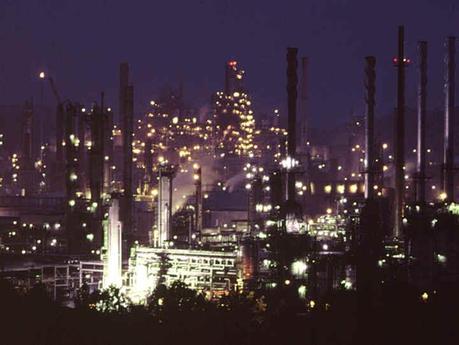 Marathon Petroleum Corp. has debuted on the New York Stock Exchange as the second- largest U.S. independent oil refiner after surging gasoline prices drove a year long rise in refining stocks.
Marathon Petroleum Corp. has debuted on the New York Stock Exchange as the second- largest U.S. independent oil refiner after surging gasoline prices drove a year long rise in refining stocks.
Marathon Petroleum is being spun off from parent Marathon Oil Corp. (MRO) amid growing investor demand for companies that can capitalize on gasoline prices that rose at twice the rate of crude oil in the past 12 months, said Sam Margolin, an analyst at Dahlman Rose & Co.
The refiner is valued at $14.7 billion in unofficial trading permitted by exchanges to help investors gauge demand, on par with the largest independent refiner, Valero Energy Corp., which has twice the fuel-making capacity. Marathon Petroleum is poised to capture higher margins thanks to upgrades at plants that account for half the company’s oil processing, said Jacques Rousseau, an analyst at RBC Capital Markets LLC.
“It’s seen as a new name in a group of companies that have run up aggressively in the past year, and people think it’s an opportunity to buy a stock that doesn’t have a chart showing a year’s worth of massive gains behind it,” said Margolin in a telephone interview from New York.
Marathon Oil Chief Executive Officer Clarence Cazalot in January revived a plan to split off the refining division after years of frustration that the fuel-producing unit was a drag on the value of the company’s more profitable crude and natural-gas business. Cazalot, a former exploration chief at Texaco Inc., canceled the original spinoff in February 2009 after the global financial collapse deflated equity markets.
Asset Sales
Since then, Marathon Oil has sold off $1.9 billion in refining, storage, pipeline and retail assets, including a plant in Minnesota, and hundreds of convenience stores. The margins earned in the U.S. from processing crude into fuels during that time almost tripled as the recession ended and energy demand rebounded.
Since assuming the top job at Marathon Oil when it was spun off by U.S. Steel Corp. in 2002, Cazalot, 60, has quadrupled net income and expanded the company’s search for oil and gas to Iraq, Indonesia and Poland. On June 1, the company agreed to pay $3.5 billion to Hilcorp Resources Holdings LP for Texas leases that may add the equivalent of 100 million barrels of crude to its reserves by the end of this year.
As a result of the transaction, Cazalot raised his production-growth estimate through 2016 to 5 percent to 7 percent a year from a previous forecast of 3 percent to 5 percent.
Shares Lag
Marathon Oil posted share price gains averaging 7 percent for the past five years, lagging Los Angeles-based Occidental Petroleum Corp. and Anadarko Petroleum Corp. of The Woodlands, Texas, which rose 17 percent and 10 percent a year, respectively. Neither Occidental nor Anadarko engage in refining.
Marathon Petroleum’s margins probably will widen starting in late 2012 after the completion of a $2.2 billion upgrade to the company’s Detroit refinery that will boost its ability to process cheaper crude, RBC’s Rousseau said in a telephone interview.
The Detroit project will increase the refinery’s capacity to handle heavy crude from Canada’s oil sands to 100,000 barrels a day from 20,000 barrels, Rousseau said. Heavy Canadian crude sells for 20 percent to 30 percent less than the lighter types of oil from the Gulf Coast that the Detroit refinery currently primarily runs, he said.
Rousseau, who has an outperform rating on Marathon Petroleum, estimates the Detroit upgrade will add $1 to Marathon Petroleum’s annual per-share earnings. He expects the shares to reach $50 within a year.
“There’s a lot to like with this story,” Rousseau said.
Refining Consolidation
As a stand-alone refiner, Marathon Petroleum will have more volatile earnings than its parent because retail fuel markets tend to fluctuate seasonally, said Ted Harper, an asset manager at Frost Investment Advisors in Houston, who helps manage about $6.8 billion. Frost Investment is a subsidiary of Cullen/Frost Bankers Inc. which held 23,797 Marathon shares as of a March 31 filing.
“They may need to smooth out their earnings stream,” Harper said. Marathon should expand its refining base through acquisitions, or add to its logistics business, which includes the largest U.S. barge fleet, he said.
The U.S. refining industry has consolidated in the past six years as fuel makers, faced with soaring crude costs, cut operating expenses and shed their least-efficient plants. The transactions have included Valero’s 2005 acquisition of Premcor Inc., Western Refining Inc.’s purchase of Giant Industries Inc. in 2007, and Holly Corp.’s planned merger with Frontier Oil Corp., which is expected to close tomorrow.
Texas City
Marathon Petroleum may seek to buy BP Plc’s Texas City refinery near Houston, the biggest U.S. plant ever to be sold as a single asset, said Neil Earnest, practice leader of merger’s and acquisitions at Muse, Stancil & Co., a consulting firm in Dallas.
BP’s Texas City refinery is the third-largest in the U.S. by virtue of 475,000 barrels of daily crude-processing capacity, according to Bloomberg data. The plant is larger than anything in Marathon’s refining portfolio and would provide the ability to export diesel to South America, Earnest said.
BP will have to lower its $2.9 billion asking price for the Texas City refinery before Marathon Petroleum could afford it, said Mark Sadeghian, senior director of energy at Fitch Ratings in Chicago.
Marathon Petroleum will trade under the symbol MPC on the New York Stock Exchange.
